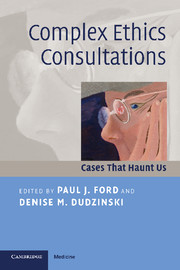25 results
Chapter 7 - Ethics Consultation Mission, Vision, Goals, and Process
- from Section 2 - Consultation
-
-
- Book:
- Guidance for Healthcare Ethics Committees
- Published online:
- 17 February 2022
- Print publication:
- 10 March 2022, pp 56-66
-
- Chapter
- Export citation
Calling Out Implicit Racial Bias as a Harm in Pediatric Care
-
- Journal:
- Cambridge Quarterly of Healthcare Ethics / Volume 25 / Issue 3 / July 2016
- Published online by Cambridge University Press:
- 27 June 2016, pp. 540-552
-
- Article
- Export citation
Commentary: In the Interest of Fairness
-
- Journal:
- Cambridge Quarterly of Healthcare Ethics / Volume 22 / Issue 4 / October 2013
- Published online by Cambridge University Press:
- 16 August 2013, pp. 401-402
-
- Article
- Export citation
Pedagogical Goals for Academic Bioethics Programs
-
- Journal:
- Cambridge Quarterly of Healthcare Ethics / Volume 22 / Issue 3 / July 2013
- Published online by Cambridge University Press:
- 30 April 2013, pp. 284-296
-
- Article
- Export citation
41 - Ethics committees and consultation services
- from Section 6 - Special topics in pediatric ethics
-
-
- Book:
- Clinical Ethics in Pediatrics
- Published online:
- 07 October 2011
- Print publication:
- 08 September 2011, pp 235-239
-
- Chapter
- Export citation
15 - The principle of double effect in palliative care: euthanasia by another name?
- from 2 - End-of-life issues
-
-
- Book:
- Clinical Ethics in Anesthesiology
- Published online:
- 05 March 2012
- Print publication:
- 28 October 2010, pp 87-91
-
- Chapter
- Export citation
Contributors
-
-
- Book:
- Clinical Ethics in Anesthesiology
- Published online:
- 05 March 2012
- Print publication:
- 28 October 2010, pp xi-xiv
-
- Chapter
- Export citation
Conclusions, educational activities, and references
-
-
- Book:
- Complex Ethics Consultations
- Published online:
- 03 May 2010
- Print publication:
- 26 June 2008, pp 226-242
-
- Chapter
- Export citation
Introduction: Live and learn: courage, honesty, and vulnerability
-
-
- Book:
- Complex Ethics Consultations
- Published online:
- 03 May 2010
- Print publication:
- 26 June 2008, pp 1-12
-
- Chapter
- Export citation
Acknowledgments
-
- Book:
- Complex Ethics Consultations
- Published online:
- 03 May 2010
- Print publication:
- 26 June 2008, pp xx-xxii
-
- Chapter
- Export citation
List of contributors
-
- Book:
- Complex Ethics Consultations
- Published online:
- 03 May 2010
- Print publication:
- 26 June 2008, pp ix-xiv
-
- Chapter
- Export citation
Part VII - The big picture: organizational issues
-
- Book:
- Complex Ethics Consultations
- Published online:
- 03 May 2010
- Print publication:
- 26 June 2008, pp 195-196
-
- Chapter
- Export citation
Part II - The most vulnerable of us: pediatrics
-
- Book:
- Complex Ethics Consultations
- Published online:
- 03 May 2010
- Print publication:
- 26 June 2008, pp 43-44
-
- Chapter
- Export citation
Part I - Starting at the beginning: prenatal and neonatal issues
-
- Book:
- Complex Ethics Consultations
- Published online:
- 03 May 2010
- Print publication:
- 26 June 2008, pp 13-14
-
- Chapter
- Export citation
Contents
-
- Book:
- Complex Ethics Consultations
- Published online:
- 03 May 2010
- Print publication:
- 26 June 2008, pp v-viii
-
- Chapter
- Export citation
Frontmatter
-
- Book:
- Complex Ethics Consultations
- Published online:
- 03 May 2010
- Print publication:
- 26 June 2008, pp i-iv
-
- Chapter
- Export citation
Part III - Diversity of desires and limits of liberty: psychiatric and psychological issues
-
- Book:
- Complex Ethics Consultations
- Published online:
- 03 May 2010
- Print publication:
- 26 June 2008, pp 73-74
-
- Chapter
- Export citation

Complex Ethics Consultations
- Cases that Haunt Us
-
- Published online:
- 03 May 2010
- Print publication:
- 26 June 2008
Part VI - Human guinea pigs and miracles: clinical innovations and unorthodox treatment
-
- Book:
- Complex Ethics Consultations
- Published online:
- 03 May 2010
- Print publication:
- 26 June 2008, pp 163-164
-
- Chapter
- Export citation
Part V - The unspeakable/unassailable: religious and cultural beliefs
-
- Book:
- Complex Ethics Consultations
- Published online:
- 03 May 2010
- Print publication:
- 26 June 2008, pp 133-134
-
- Chapter
- Export citation

